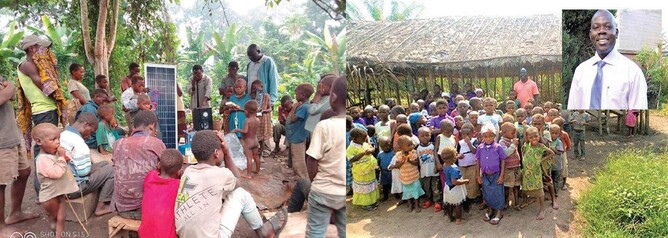It was our privilege more than 30 years ago to meet Way Alege. He was a very energetic, gifted and keen Christian, more than willing to use his dramatic ability to work with us recording programs for non-readers. Dr Way Alege has worked extremely long hours with little sleep over the past seven years while teaching at Shalom Christian University, Bunia, and completed his doctorate early this year. We all looked forward to his graduation at Deakin University, Melbourne, but it was not to be as COVID-19 interrupted plans. His doctorate was entitled ‘Reconciling development interventions with communities’ vital concerns in Ituri Province’. To achieve his goal he travelled thousands of kilometres (mostly on motorbike), gathering data and encouraging groups who had not had a visitor for many years. Way has a huge heart for the forest Pygmy population and has the ability and training to help with development in forest areas while sharing the good news of Jesus with many. While writing his thesis and teaching at the university, he regularly visited Pygmy camps and has set up educational, agricultural, health and church programs in three Pygmy camp areas. We have had the privilege of supporting Way in this work for many years and have also been privileged to make recordings in a number of languages in this region. Way is faithful in sending bimonthly updates which can be read on our website www.wordnworks.org
Some extracts from those reports are printed below.
1. Classrooms renovation
Four out of eight classrooms have been renovated. We are producing more timber to complete the remaining classes, the office building, make desks and furniture for the office, and to fix windows and doors.
2. Forestation and Agriculture
In general, renovation of schools and improvement of shelters are consuming a lot of timber. Therefore, we are creating awareness among the Pygmies, particularly with the children, to plant trees. In the first place, we are securing our property limits to prevent land grabbing. In Ataloholu and Kangakolo, we have approximately 62 hectares in total. In Shaurimoya, we have approximately 33 hectares. All these properties need protection against intruders.
3. Animal husbandry (Animal Credit Scheme)
To avoid poor hatching, we have locally made a solar panel incubator. The capacity is approximately 60 to 80 eggs. We are in the experimental stage to test the percentage of successful hatchings.
In approximately three months, 20 ducks will be laying eggs. Soon we are expecting at least 100 to 150 eggs and this will help the rapid multiplication of ducks. Our aim is to start up an Animal Credit Scheme (ACS) in partnership with families who are not able to pay their children’s school fees. They will be supplied with ducks or rabbits, then families will be trained in raising and marketing techniques.
During this period of confinement, our technical team (veterinary service, hygiene, child protection, head teacher) spent a few hours each day with children in the animal farm and shared devotions. The main goal is to expose them to biblical and practical on-field experience
4. Health and child and women protection against violence
A Medical dispensary was opened in April 2019 in Shaurimoya when Clarice, the long-awaited nurse who came after her midwifery training, was officially introduced. The Pygmies seem to be willing to understand health issues and a community health program will help reduce the cases of sicknesses among them. Apart from offering medical care, from time to time, Clarice monitors the health of the Pygmies in the different camps.
We are happy that the Child and Women Protection Project is gaining roots in the Pygmy camp. Children fear less than in the past and women are more receptive to remarks made about the way they handle their children. However, quarrelling is still frequent between households and family members
5. Bible study
Despite church closure because of COVID-19, we continue holding our Sunday morning devotions. In the last month we have noticed more enthusiasm for the Word of God. We believe that intensifying the gospel by listening through loudspeakers instead of listening to family disputes would be more advantageous. We are looking into making this possible.
6. Setting up community audio system
With the left hand placed on the sound system, while the right hand covered half of his face, Polipo dedicated in prayer the system for audio lessons. This was how the prayer of Polipo, the Pygmy chief, was clearly given: “...God our Father, we thank you very much. Today we have seen things that our ancestors never saw. Today we have benefited from what our ancestors never benefited from. Bless this person who donated his money through our brother Way so that we can own this radio...”
After the installation of the solar panel, curious children stormed the house to admire the new audio system which is comprised of the main radio and three loudspeakers. Now the entire camp can benefit from biblical teaching at the same time instead of giving one radio per household.
Complied by Noela Elvery & Julie Loudon
Photos by Way Aleg

